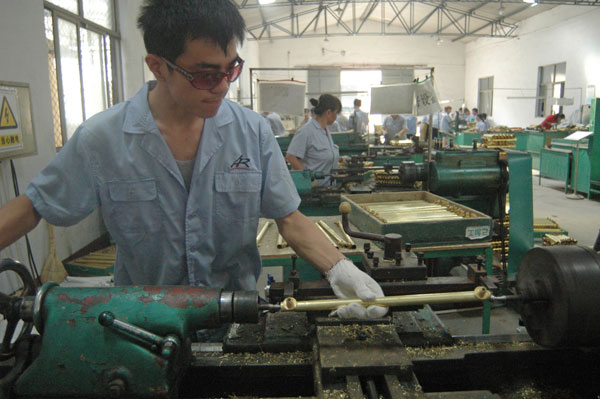Monetary policies helping to ease threat of deflation
Updated: 2015-08-04 14:27
By Yi Huan and Liang Hong(China Daily)
|
|||||||||||
GDP figures for the second quarter show that deflationary pressure is starting to ease.
While China's real GDP growth rate is 7 percent, which is the same as the first quarter, what is significant is that nominal GDP growth reached 7.1 percent.
Nominal GDP is calculated without adjustments for inflation, which highlights the slight upward trend toward reflation.
This is being largely fueled by an increase in service sector inflation, a property price recovery and a rise in agricultural products.
Looking at the detailed data, overall reflation in the second quarter was the result of a more expansionary monetary policy, which was brought in during the second half of last year, including lower interest rates.
Moves like this to stimulate the economy have accelerated since March, with interest rates continuing to fall. From a macro perspective, the trajectories of interest rates and inflation have become more favorable in the second quarter.
The average lending rate of under 6 percent in June has dropped below nominal GDP growth of 7.1 percent, which has reversed the deflationary spiral of the first quarter, and set up the economy for a more "reflationary" environment.
Looking forward, we expect lending and deposit rates to continue to drift down in second half of this year, especially in the third quarter as monetary easing trickles through the system.
The favorable combination of lower rates and higher aggregate inflation will drive a further recovery in demand, especially in the property sector.
While recent market talk about inflation has revolved around rising pork prices, we believe the speed of monetary expansion is the underlining reason behind the increase.
As monetary expansion accelerates, a recovery in demand could lead to higher inflation in food sectors such as pork and other meat products.
We have become more optimistic on the levels of inflation in the second half. We have raised our GDP deflator forecast to 0.3 percent and 1.2 percent for the third and fourth quarters, respectively, from 0.3 percent and 0.7 percent.
More specifically, we expect higher inflation in sectors with a more pronounced recovery in demand, including consumer services and property-related industries. As a result, we have raised our Consumer Price Index forecasts. For the third quarter, we expect a 1.9 percent rise instead of 1.4 percent.
For the fourth quarter, we expect a 2.2 percent increase instead of 1.6 percent. This will mean a year-ending CPI reading of around 2.3 percent.
Looking beyond the second half of this year, we believe it will be necessary to maintain supportive monetary policies to help steer nominal GDP growth back to a "normalized" level.
Yi Huan is an analyst of China International Capital Corp and Liang Hong is the chief economist of CICC. The views do not necessarily reflect those of China Daily.
Related Stories
China's QE on the way? No! 2015-04-29 17:42
PBOC joins shift to boost growth 2015-02-06 07:32
China forex settlement surplus narrows in 2014 2015-01-22 16:25
China's central bank extends MLF 2015-01-22 13:31
China boosts financial support to small firms, agriculture 2015-01-16 14:01
Today's Top News
Obama issues challenge on climate change
Erdogan pledges to fight back as PKK steps up attacks
AIIB, Silk Road parts of China's strategy to benefit the world
Overseas journalists invited to cover China's V-Day celebrations
Greek market tumbles after five-week shutdown
Malaysia seeks international help in search of MH370
French, Malaysian experts meet for MH370 probe
Overseas journalists invited to cover China's V-Day celebrations
Hot Topics
Lunar probe , China growth forecasts, Emission rules get tougher, China seen through 'colored lens', International board,
Editor's Picks

|

|

|

|

|

|






